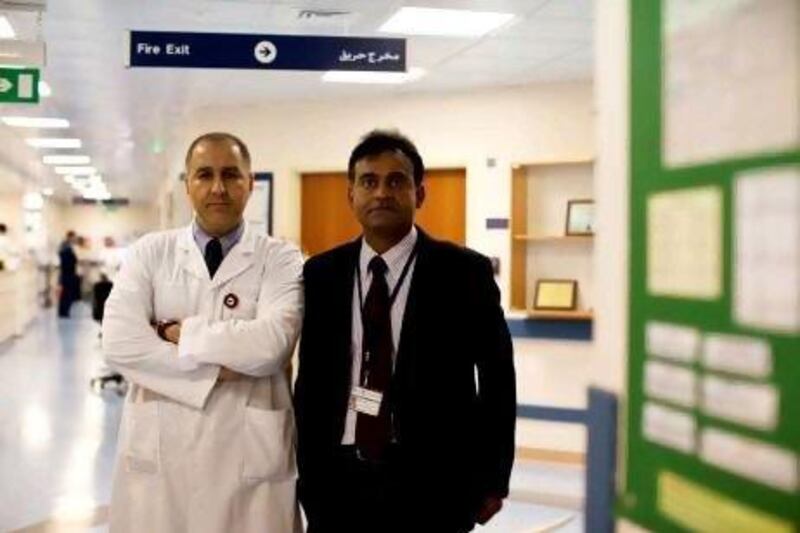ABU DHABI // A law that would help hundreds of patients on dialysis move a step closer to receiving a kidney transplant was submitted to the Executive Council last month and is awaiting final approval.
The law would allow organ transplants from patients who are declared brain-dead, and will require the Emirates identification card to indicate whether or not an individual is an organ donor.
Dr Ammar Abdulbaki, a transplant nephrologist at Sheikh Khalifa Medical City (SKMC), said applicants for an Emirates ID would have to tick off a box regarding organ donation that would indicate whether "you're willing, not willing or not sure".
"Everyone will be asked that question," Dr Abdulbaki said.
The news comes two years after an amendment signed by the former minister of health made it legal to take an organ from a deceased donor if they had allowed it in their will, or if a majority of their closest relatives agreed to it. The amendment updated a 1993 law that provided the medical parameters for doctors to perform transplants. Doctors, however, said the law did not provide specific guidelines needed to set up and regulate the infrastructure for such a programme. They also said the law did not define death.
The new law calls for forming official bodies that will regulate organ transplants, including the National Transplant Centre, which will allocate the organs, and the National Transplant Committee. The National Transplant Centre will also be responsible for integrating the transplant programme with the Emirates ID card. The National Transplant Committee, which was formed in 2010, will develop into a full-fledged organisation.
Dr Abdulbaki, who is also the medical director of SKMC's transplant programme, helped revise the law. He said it had been endorsed by various authorities, including the Health Authority - Abu Dhabi, the Ministry of Justice and the General Authority of Islamic Affairs and Endowments.
Across the country, there are nearly 1,500 people on dialysis, of whom nearly half are considered candidates for a kidney transplant. The SKMC programme is the only one in the country. Since its launch in 2008, its team has performed 57 kidney transplants, with a 95 per cent success rate. The team is trying to increase the number of transplants to one a week.
Dr Abdulbaki said the number of people with kidney failure was rising by about 9 per cent annually, which he attributed to the high rate of diabetes in the UAE. Diabetes affects nearly a quarter of the population, of whom one third are at risk of kidney failure.
The main challenge, Dr Abdulbaki said, is finding a donor organ. For several years, organ transplants from the dead have been available everywhere in the GCC except the UAE.
"In this region, 70 per cent of kidney transplants come from living donors, and the remaining 30 per cent from brain-dead donors," Dr Abdulbaki said. "But we're not seeing this here, so the public needs to be aware and encouraged to donate during life and after death. They need to know that donating a kidney does not affect their health or life at all."
Liver transplants are next in demand, with an estimated 100 to 200 patients in the country at some stage of liver failure. This is where the new law will also have a significant impact, Dr Abdulbaki said.
"You don't necessarily die from kidney failure because you can go on dialysis until you get a transplant, whereas when your liver shuts down you either die or get a transplant immediately."
In the UAE, a kidney transplant costs Dh100,000 to Dh150,000.
After the procedure, patients are put on immunosuppressive drugs to prevent rejection. The government provides the funds, which are managed by insurance companies.
The UAE does not permit transplants from unrelated living donors. This is to protect donors and patients from abuse, doctors said.
"Because of the social fabric in the Gulf countries, you may open the door for abuse," Dr Abdulbaki said. "There will be monetary compensation, people buying organs from disadvantaged people, like their drivers and maids."
Restoring faith in the country's health system is another challenge, Dr Abdulbaki said.
"As a small example, we are still working on building the trust of Emiratis in this programme," he said. "Out of 57 cases we transplanted here, only five were Emiratis, because there is a belief that when you need a transplant the government should send you abroad."
This often comes at a price.
"When you buy a kidney from outside, you can pick up an infection, or get a bad kidney because someone sold it to you and you never know the quality of the organ," Dr Abdulbaki said. "It costs double or triple the cost in the UAE, and little quality. That is the third challenge - raising awareness that the government offers these services at high quality in this country."





